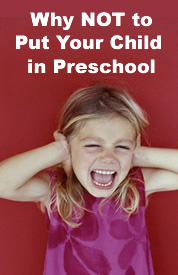The Truth: Early Academics?!
Until the last 40 years or so, most children weren’t introduced to the alphabet (in a formal lesson type of way) until Kindergarten. Nowadays, many children are taught the alphabet in preschool—or even before (as toddlers.) The end result has not been encouraging: The more the public schools demand of young children, the worse America’s children do—academically and otherwise. More and more children are being diagnosed with learning disorders; many developmental experts believe this is due to the “push down” in curriculum combined with a lack of time for play and other more traditional preschool-type activities. Why would we, as homepreschoolers, want to follow that model?
Perhaps we’ve only heard one side of the argument.
The truth is, not one single study that has shown that early academics are beneficial to young children. There is no proof that learning to read earlier is better than learning later. However, there is considerable proof that early academics can cause harm. But don’t take my word for it; read the articles below for yourself. They are worth your time.
Resources about Readiness:
“Moving up the Grades: Relationship between Preschool Model and Later School Success”, by Rebecca A. Marcon, University of North Florida
Important points: “Children whose preschool experience was child initiated faired better than peers in the transition from the primary to the later elementary school grades. Not only were their overall grades following the transition significantly higher, their school performance improved or held constant in all but two subject areas (music, social studies) despite increased academic demands of the next grade level.….By the end of their sixth year in school, children whose preschool experiences had been academically directed earned significantly lower grades compared to children who had attended child-initiated preschool classes. Children’s later school success appears to have been enhanced by more active, child-initiated early learning experiences. Their progress may have been slowed by overly academic preschool experiences that introduced formalized learning experiences too early for most children’s developmental status.” Read the entire article HERE.
”Academics, Literacy, and Young Children,” Childhood Education, Spring 2000, by Elizabeth M. Nel:
Important points: “According to Elkind (1987), academic learning fueled by motivation other than the child’s innate interests constitutes miseducation. It puts a child at risk for psychological damage (Werner & Strother, 1987); what is worse, it is apparently for no good reason, since the benefits of early reading instruction are relatively insignificant.
…Therefore, with respect to literacy, developmentally appropriate preschool academics do not involve formal reading instruction, but rather they promote print awareness (Kontos, 1986) by exposing young children to letters, words, and numbers in meaningful contexts (Lesiak, 1997).
…Reading to children is one of the best ways to model literacy skills (Bus, Van Ijzendoorn, & Pellegrini, 1995). Reading should not be limited to a set storytime, but rather should be shared with children throughout the day.” Read the entire article HERE.
“Rush Little Baby: How the Push for Infant Academics Might Actually be a Waste of Time-or Worse”, by By Neil Swidey, October 28, 2007, The Boston Globe
(Watch the video, then scroll down for the article. It’s long, but worth the time; and it’s not only about infants.)
Important points: “A classic study in the 1930s by noted researcher and Illinois educator Carleton Washburne compared the trajectories of children who had begun reading at several ages, up to 7. Washburne concluded that, in general, a child could best learn to read beginning around the age of 6. By middle school, he found no appreciable difference in reading levels between the kids who had started young versus the kids who had started later, except the earlier readers appeared to be less motivated and less excited about reading.
…‘Many efforts to teach a child to read before 4 or 5 years of age are biologically precipitate and potentially counterproductive for many children.’ The danger in pushing reading too early, Wolf says, is that, for many children, we may be asking them to do something for which their brains are not ready. “You run the risk of making a child feel like a failure before they’ve even begun,” she says. And while the gains from early reading may fade away, the damage from being tagged a slow kid at a young age has the potential to be permanent.
…..Study after study shows the best thing parents can do for their children is give them a nurturing, rich, vibrant environment, reading to them often and exposing them to lots of language in organic ways. Reading books out loud is most effective when the parent uses the words on the page to help the child make connections to his or her own world.
…As long as parents are exposing their children to a nurturing, vibrant environment, reading to them regularly, and speaking with them intelligently, they should feel free to put the flash cards away.”
Read the entire article HERE.
Relax and enjoy the preschool years! Follow your children’s lead when it comes to early academics! Watch your children for signs of interest and natural learning, so that you neither push nor hold them back. Find the balance.
For more information about early academics/readiness, see the tab, “Readiness”, the tab, “Important Links”, and my archived posts on readiness.
© 2010 Susan Lemons all rights reserved.






Thandi said
Thank God for Rachie Kae who directed me to this website!!! Thank God for you too 🙂 As a mom of as soon-to-be 4 year old and her 5 year old brother, in South Africa, I’m virtually alone when it comes to this homeschooling thing. I prefer to teach them during play, or when we cook (read -I cook and they taste) together. I’ve always been a fan of delayed homeschooling but have no real ‘direction.’ I will be looking through this website and reading every single thing you’ve typed. Thank you so so so so much.
homeschoolmentormom said
Aw…thanks! I’m glad you found me! Thank God for parents like you who are willing to step out in faith and do what they believe is best for their children–even when they are “swimming upstream.”
Remember that saving formal academics for later (waiting for readiness) is not the same as delaying education–young children are learning all the time–and they DO learn best through natural activities, as you described. Once you decide they are ready for academics, you’ll discover that they pick them up quickly and easily.
Hang in there–perhaps as homeschooling grows in SA, you’ll be able to find (or help establish) your own support group.
Live the 4R’s!
Susan
Nolene Gosling said
Hi Susan. My name is Nolene Gosling, also from South Africa. I have just read the book “Better late than early”, by Dorothy Moore and it has helped me so much in deciding to keep my 3 BOYS at home..especially in the early years. they are just not ready yet for the structured approach of school and they definately have way to much energy!! They suggest kids are only ready to read by age 8…what do you think?? Would really appreciate your help! my boys are now 5,3 and half and 17 months.
God bless,
Nolene Gosling
homeschoolmentormom said
Hi Nolene,
I have read most of the Moore’s books and enjoyed them—especially Home Grown Kids. I agree with most of their philosophy. I do believe that the current emphasis on early formal academics is misguided; however, I also believe that waiting until age eight is a waiting a long time! I certainly wouldn’t make that the “rule”.
I think parents have to decide when their children are ready for “formal” lessons…especially learning how to read. If you watch for signs of interest, emerging skills, and spontaneous learning, and then start with short, fun lessons on a trial basis, you will do well. If your son struggles or resists the lessons, set them aside and wait awhile longer.
In my experience, most children do well if “formal” lessons are introduced around age 6. The first lessons should be short, fun, and game-based, if possible. But children can learn a lot before then! If you establish a simple daily routine that includes lots of reading aloud, art experiences, music, and lots of play, your boys will learn so much!! Time playing outside and time spent learning to work, as the Moores say, will help them use their boundless energy.
I don’t know if my book is available in South Africa…but it is available on Kindle (on Amazon). I think it would be a help to you.
Blessings,
Susan